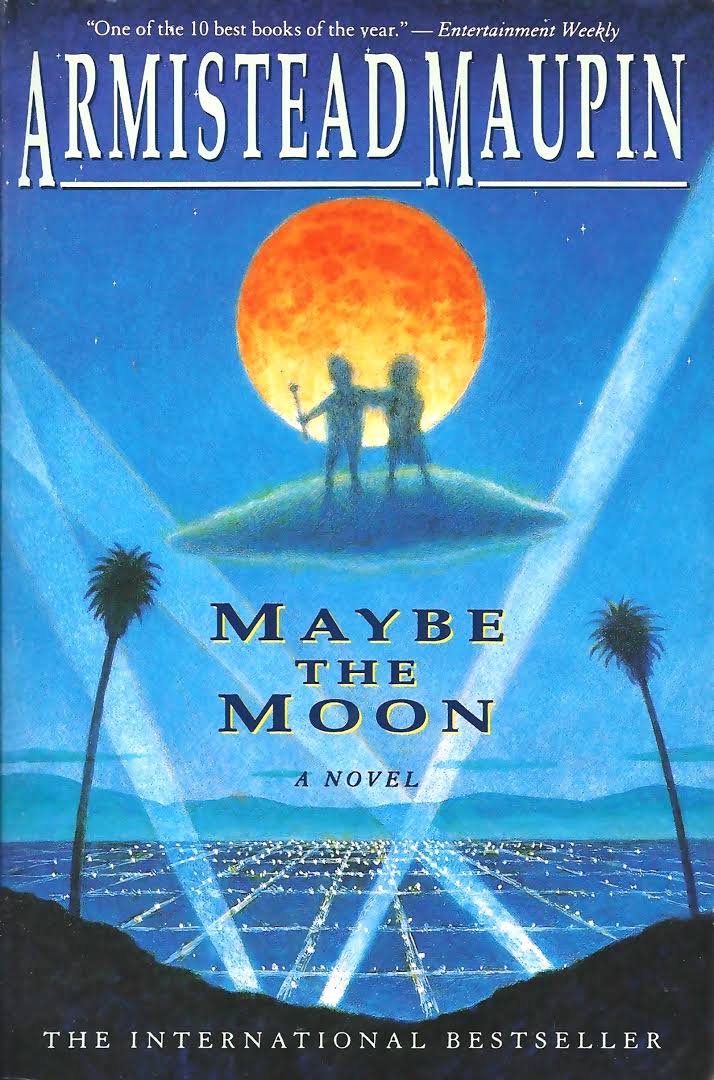MAYBE THE MOON
By Armistead Maupin

Armistead Maupin is poised -- with his unique penchant for
mixing serious social issues with volatile, subjective
reality -- to knock holes in modern literature. And his major
weapon is a rapier wit and an ultra-wry sense of humour.
Maupin has emerged as the first author to deal fictionally with
the subject of AIDS. And in the process, he has graduated from
the status of underground humourist and cult hero to that of
mainstream satirist.
His books have sold over a million copies worldwide, with
translations into German, Spanish and Dutch.
Maupin's body of work chronicles the social scene of people who,
like himself, were drawn to San Francisco's opulently gay
society. Since his 1987 debut, the steamy Tales Of The City, he
has taken his comic cast of characters from the good-time party
days of the 70s to the 80s -- a decade dominated by the looming
spectre of AIDS.
With a passionate and distinctive voice, he weaves straight,
lesbian and gay storylines with a deceptive ease that veils his
political savvy. In his gritty character depictions, Maupin's
city tales are "about people moving towards the expression of
their true selves as honestly as they can."
In his new novel, Maybe The Moon, the longtime spokesperson on
gay and lesbian issues has his critical gaze primed and set on
Hollywood -- revealing its hypocritically sexist, homophobic and
racist backroom dealings.
Although liberally spiced with household celebrity names, the
story is a tragicomic odyssey through the lives of people on the
periphery.
The book brutally and brilliantly exposes the time-honoured
Hollywood tradition of mocking and dehumanizing those who
challenge the status quo's perception of what is normal.
A milestone for Maupin, the novel is his first attempt at
writing in the first person. The heroine of the novel is
30-year-old Cadence Roth -- a 31-inch-tall Jewish dwarf who once
held the distinction of being the world's shortest "mobile
human" in the Guinness Book Of Records.
Maupin says that the character of Cady, as everyone calls her,
was inspired by, but not based on, the life of his friend Tamara
DeTreaux -- the actor who inhabited the tiny rubber suit in
Steven Spielberg's box office titan, E.T.
In this fictionalized account, Cady suffers the same indignities
when starring in Mr. Woods, an epic fantasy about a tree elf
abandoned in the suburbs.
Ten years later, the movie still holds American hearts
captive -- and Cady struggles to find work that is not a similar
affront to her dignity.
Maupin tells this wonderfully bizarre story through Cady's
highly personal and witty diary entries. She has been persuaded
to keep a journal by her dippy, air-headed roommate Renee, who
is convinced that Cady's life will one day he made into a movie.
Simply and beautifully written, Moon takes the reader on an
intimate journey through the lives of Cady and her friends -- an
eclectic collection of battered souls, including a gay writer, a
black piano player and, of course, Renee.
But Maupin has gathered together this menagerie for much more
than the sake of political correctness.
"All these characters are fully human and have to deal with some
aspect about themselves which doesn't conform to the Hollywood
aesthetic vision," he says on a tour stop from Los Angeles, "My
aim was to have readers inhabit the character of Cady so
thoroughly that they forget her size -- creating an intimacy
that makes reading just like dreaming."
At its most hard hitting, Maybe The Moon directly takes on the
closeted gays and lesbians in Tinseltown. This is most evident
in Maupin's treatment of a character named Callum, a gay former
child star making his screen comeback in a patently
homophobic role.
"Every gay and lesbian in Hollywood is in this dilemma where
they are told to stay in the closet, often by agents who are gay
or lesbian themselves," says Maupin. "I've known actors who have
felt the strongest pressure to keep quiet to other gays in
the business."
He says this institutionalized homophobia is generated more from
homosexuals than heterosexuals.
"There are power networks in Hollywood that are based on a
secret society of gay people who view coming out as destructive
to their careers."
The sad message of the novel, he says, is that "truth is far
more interesting than any movie -- but Hollywood continues to
crank out sanitized, white-bread versions of life. I wanted to
show how the desperate, who need to be perceived as normal are
robbed of the richness of experience."
-- sigcino moyo
original publication: NOW
|


